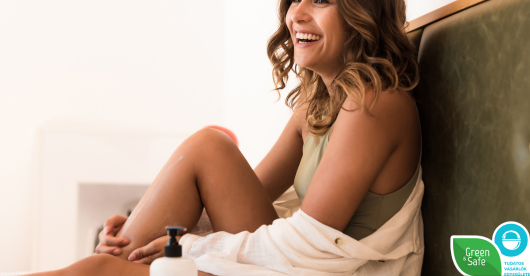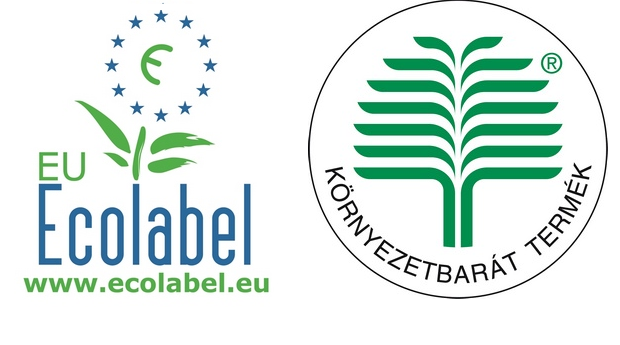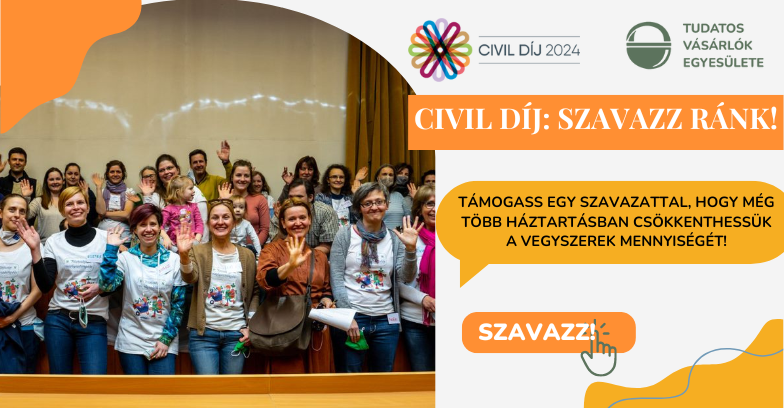
Menstruation can become even safer
Recent tightenings will make eco-labeled sanitary pads and tampons even safer. New development is that the eco-label, which qualifies the most environmentally friendly and health-safe products available on the market, will appear on this popular product group in the future.
Toiletries and really, everywhere you look all sorts of products are wrapped up in authentic or self-proclaimed ‘eco-labels’. However, as it has been proven from time to time, products with fake eco-labels may contain substances harmful to health and the environment.
The results of the latest investigation of such were published by the American Chemical Society on August 13: persistent chemicals (PFAS) were found in some period products. Persistent chemicals remain with us for a very long time and have been linked to serious health and environmental problems such as cancer, liver disease, infertility, reduced birth weight and impaired immune systems.
In order to stop greenwashing, consumers should be able to recognize and choose the real, authentically certified product.
 The EU-Ecolabel shows which products are safe and which do not contain substances harmful to health, e.g. ingredients that damage the hormone system and cause allergies. There are also some national eco-labels that are strong enough to be equivalent to the EU-Ecolabel, such as the Hungarian Environmentally Friendly Product, the Nordic Ecolabel or the Blauer Engel.
The EU-Ecolabel shows which products are safe and which do not contain substances harmful to health, e.g. ingredients that damage the hormone system and cause allergies. There are also some national eco-labels that are strong enough to be equivalent to the EU-Ecolabel, such as the Hungarian Environmentally Friendly Product, the Nordic Ecolabel or the Blauer Engel.
You can find eco-labeled products available here on our website or in the Conscious Consumer mobile application, both are free:
Given the above-described reasons, the EU have tightened rules on the criteria of the EU-Ecolabel and at the same time have extended the eligibility of the certification to further product categories. Since 2021, we can see it on all cosmetic products, and we may choose from a range of other products with eco-label such as diapers, office supplies, etc. According to the plans, the ecolabel eligibility for textile products will also be extended to washable diapers this year.
What will change?
This summer, the European Union has adopted new EU Ecolabel criteria for Absorbent Hygiene Products. This means that the brand new criteria
- provide more stringent environmental and health guarantees for these products.
- New thing is that the eco-label, which qualifies the safest available products for the environment and health, will now appear on a new popular, reusable product group: menstrual cups will also be available eco-certified.
Why are eco-labeled pads and menstrual cups better?
It’s better for our health:
A woman uses an average of 12,000 tampons or pads during her lifetime.
The criteria impose very strict requirements on hazardous chemicals.
The requirements have been tightened including a complete restriction of the most dangerous substances and a comprehensive list of specific substances or groups of chemicals that shall not be used.
Absorbent products/menstrual cups (among others) holding the EU Ecolabel do not contain:
– Endocrine Disrupting Chemicals (EDCs) – including suspected EDCs: Because of their ability to mimic, interfere with, and block natural hormones, exposure to even small amounts of EDCs may cause serious and irreversible effects on human health, such as infertility, cancer, genital abnormalities, reduced IQ, or obesity.
– Parabens: their exclusion is important because parabens may disrupt your hormonal system leading to health problems such as disrupting hormone production or affecting the reproductive system.
– Formaldehyde: often used as an adhesive; it may cause eye, nose and throat irritation, as well as skin irritation. Exposure to high levels of formaldehyde is suspected of causing cancer.
– Fragrances or lotions: they are often added to health products for cosmetic reasons, but do not perform any necessary function. Thanks to the EU Ecolabel these substances are excluded, thus avoiding unnecessary exposure to sensitizing substances that cause skin irritation and allergies.
– Phthalates: Some phthalates are or are suspected to be endocrine disruptors or have other dangerous properties. Although our knowledge of some of them is still limited, they all have the same chemical structure, so, following a precautionary approach, the EU Ecolabel has restricted the entire group.
The examination of the final product for hazardous substances is also a new requirement. This provides an extra safety net against substances that are added unintentionally but may be present in diapers or feminine pads as a result of contamination during manufacturing processes (such as dioxins, formaldehyde, phthalates, pesticides such as glyphosate or heavy metals).
In addition, by requiring good results in laboratory and customer satisfaction tests, they ensure that the certified products meet the quality requirements.
Intim tudatosság – egyre népszerűbb a mosható betét és a menstruációs kehely
It’s better for the environment:
– Sustainable material sourcing: all flaky cellulose pulp and cellulose fibers can be traced through the chain of custody, increasing the proportion of fibers from sustainably managed forests in accordance with the FSC and PEFC standards. All cotton must be organic. When using bio-based plastics, the requirements for sustainable procurement apply.
– Stricter requirements to further reduce environmental pollution resulting from emissions into water and air during the production process. For example, by requiring cleaner bleaching processes or by limiting the CO2 emissions allowed during production.
– The products must be produced without the use of chemicals that harm the environment, such as those that are toxic to aquatic life.
– New requirements to limit the impact of packaging and the amount of packaging waste, for example by requiring the use of recycled materials in the case of paper and plastic.
– Less waste is generated during production by introducing the maximum allowed amount of waste per unit.
How safe are non-certified pads and tampons?
As for the potential health effects, the phthalate content and dissolution of phthalates as well as the paraben and triclosan content in intimate pads and tampons was tested in 2014 by the Conscious Consumers. What we found then was that many of the tested products contained 4-5 types of phthalates at the same time; although very low quantities but all the tested products contained such compounds. One pad and two tampons contained triclosan. Paraben was found in one of the pads.
It is also certain that the use of products that come into direct contact with the mucous membrane poses an increased risk due to the absorption of harmful substances: for example, substances with a hormonal effect are absorbed 10-80 times better on the mucous membrane of the female genital organs than through the mouth.
In the case of disposable sanitary products, the environmental impacts are mainly related to the production phase (e.g. energy consumption and chemical use) and to the raw material consumption (e.g. the flaky cellulose pulp or other cellulose fibers from which the products are largely made).
How safe are non-certified menstrual cups?
From an environmental point of view, reusable devices, such as the menstrual cups, are clearly a better alternative to disposable products.
A few years ago, we tested whether these products could cause health problems, how durable they are, and how convenient and practical they are to use. We tested in the laboratory whether these products contain potentially carcinogenic or hormone-disrupting substances: nitrosamine, chlorinated paraffins, phthalates, PAH (polycyclic aromatic hydrocarbons), formaldehyde, potentially allergenic protein, soluble dyes.
 This content has been produced with the support of the Ministry of Innovation and Technology’s tender FV-I-22-19-C. Green&Safe LIFE-styles project is supported by the LIFE programme of the European Union. Project number: ENV GIE HU000622
This content has been produced with the support of the Ministry of Innovation and Technology’s tender FV-I-22-19-C. Green&Safe LIFE-styles project is supported by the LIFE programme of the European Union. Project number: ENV GIE HU000622




